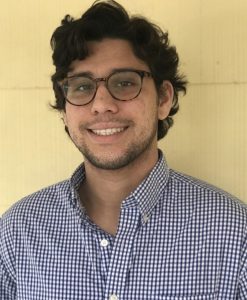 My name is Joshua Lopez and I am a Junior from Greenville, North Carolina studying Neuroscience and Music. From my first day at Carolina I knew that research was something I was passionate about. I set out to find a position in a lab and during my search I began to solidify the research topics I found interesting. I am greatly interested in studying topics in neuroscience including the molecular functioning of neurons, the physiology changes responsible for addiction, and the neural components of pain perception. As a Sophomore, I was lucky enough to become part of the Zylka Lab as an undergraduate researcher. In this lab, I have continued to work on a project to assess, quantitatively, the level of pain exhibited by a mouse through the use of machine learning. Working in this lab changed my view of research and inspired me to seek out more research opportunities, leading me to the Gil internship.
My name is Joshua Lopez and I am a Junior from Greenville, North Carolina studying Neuroscience and Music. From my first day at Carolina I knew that research was something I was passionate about. I set out to find a position in a lab and during my search I began to solidify the research topics I found interesting. I am greatly interested in studying topics in neuroscience including the molecular functioning of neurons, the physiology changes responsible for addiction, and the neural components of pain perception. As a Sophomore, I was lucky enough to become part of the Zylka Lab as an undergraduate researcher. In this lab, I have continued to work on a project to assess, quantitatively, the level of pain exhibited by a mouse through the use of machine learning. Working in this lab changed my view of research and inspired me to seek out more research opportunities, leading me to the Gil internship.
As a Gil intern, I had the opportunity to gain an entirely new lab experience. During the spring, I was an intern under Dr. Kyle Burger in the Neuropsychology of Ingestive Behaviors Lab (NIBL). The mission of the lab is to discover the underlying determinants of food choice and ingestive behaviors that drive weight-related diseases through the use of qualitative and quantitative methodologies. My main role as an intern in this lab was to be as multifaceted as possible. I learned to run behavioral assessments, aid in neural scans, prepare literature searches, utilize R, and generally help wherever I can. I also worked on developing my own project to present at the end of the Gil internship. Working as an intern in NIBL has substantially broadened my understanding of scientific research and working with human participants. It was interesting comparing the research done in the Zylka lab with the research done in NIBL. I believe experiencing the limitations and benefits of both research utilizing animal models and research with human participants will allow me to become a more well-rounded researcher.
The final component of the Gil internship that aided in my educational development was the opportunities from the in-class portion. Through the assignments and discussion topics completed every week, I have greatly enhanced my understanding of how to succeed in a career in neuroscience. From streamlining my resumé to practicing interviewing and networking, the Gil program has helped me gain valuable tools for wherever my professional career takes me.
Post-graduation, I am planning to apply to medical school in hopes of earning an MD/PHD. My dream is to become a researcher and professor, helping to further our understanding of the brain and its underpinnings.
